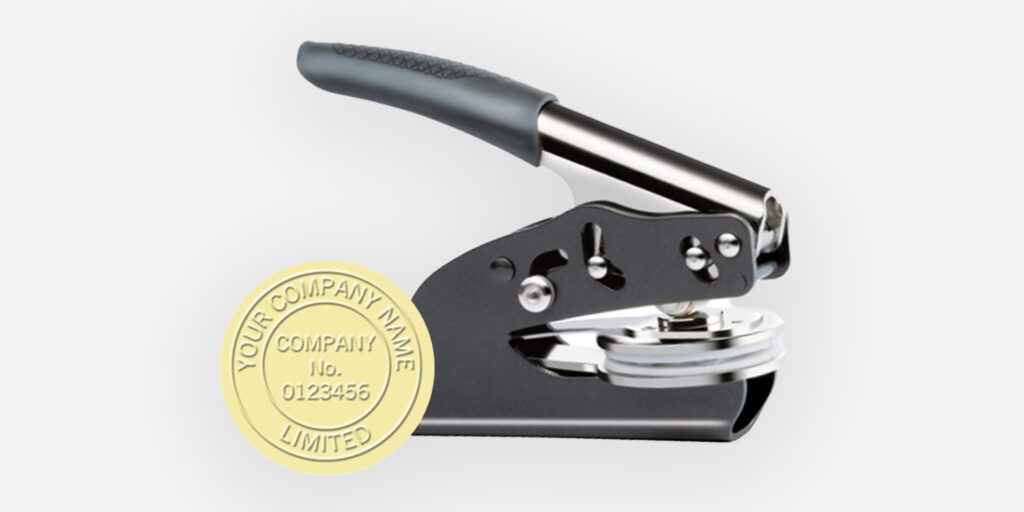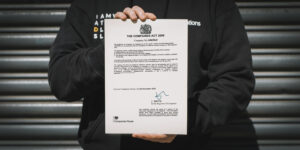A company seal is a stamp that signs a document on behalf of a company. It can be affixed with an embossing tool that engraves a company’s details onto a document. Seals have historically been used to sign legal records, like contracts, deeds, and certificates.
Since the legal requirement for seals was abolished in 1989, we don’t see them around much anymore. However, some businesses still like to use them, especially if they are conducting business abroad or if they wish to exude an air of old-world authority.
Below, we explain what a company seal is, its purpose, and how to use it. We also highlight the potential benefits of using a company seal nowadays to help you determine whether your business might need one.
What is a company seal?
Also known as a corporate or common seal, a company seal is a stamp that authenticates documents on a company’s behalf—like a corporate signature. It’s customised to each organisation and normally displays its registered name and incorporation number. Here are a few ways to use them:
- Signing a lease, contract, or agreement
- Signing a property deed
- Validating share certificates
- Authorising invoices or other financial transactions
- Conducting overseas business
- Signing board meeting minutes
- Signing articles of association
Over the years, numerous tools have been used to affix company seals (e.g. wax stamps), but the device you’re most likely to find today is an embosser. It’s a small clamp that sandwiches a piece of paper between two round plates, leaving the company information engraved in the document. See the feature image above for an example.
Company seals can come in various sizes (even pocket-sized ones) and produce stamps of different shapes.
Current UK regulations
When using a company seal, it must feature your organisation’s registered name engraved in legible characters. If the seal does not feature this, it is an offence which the company and every officer will be liable for.
With regards to when they can be used, Section 44 of the Companies Act 2006 states that:
1. Under the law of England and Wales or Northern Ireland a document is executed by a company—
(a) by the affixing of its common seal, or
(b) by signature in accordance with the following provisions
2. A document is validly executed by a company if it is signed on behalf of the company—
(a) by two authorised signatories, or
(b) by a director of the company in the presence of a witness who attests the signature.
This means that companies may sign documents using a seal, but it is not essential. Instead, they may use two authorised signatories or one authorised signatory and a witness.
Authorised officers are all directors and the company secretary (if there is one—this is optional for private limited companies and compulsory for public limited companies). If there aren’t two authorised signatories available (e.g. if you’re the sole director of a private limited company without a secretary), this is where the document must also be witnessed.
- What is an objects clause?
- Do I need to appoint a company secretary?
- Do I need a shareholders’ agreement when I set up a company?
So, confusingly, the above sounds like you can use either a company seal or authorised signatories to validate documents. However, this isn’t entirely the case.
According to the Model Articles of association, under which most private limited companies are incorporated:
- Any common seal may only be used by the authority of the directors.
- The directors may decide by what that means and in what form any common seal is to be used.
- Unless otherwise decided by the directors, if the company has a common seal and it is affixed to a document, the document must also be signed by at least one authorised person in the presence of a witness who attests the signature.
This means company seals are insufficient on their own if your company has the Model Articles. If you want to use one without the additional requirement for an authorised signature, you need to hold a board meeting for directors to agree on this motion. If approved, you will be able to use the company seal without an accompanying authorised signature.
Please note that if your business operates under bespoke articles of association or was formed prior to 2006 and has not updated its articles since then, the rules regarding the use of company seals may be different and you should seek legal advice before using one.
The rules are also slightly different depending on the type of document you want to sign. The below scenarios are based on your company operating with the Model Articles:
Contracts
If a company wishes to use a company seal, the seal will need to be accompanied by an authorised signature and a witness signature, unless a board resolution has been passed which removes this requirement.
In almost all cases, using a company seal for signing a contract is less convenient than having an authorised signatory signing on behalf of the company. This is because contracts only require one authorised signatory to sign on behalf of the company, and no witness.
Deeds
For deeds, the company seal works in the same way as contracts – i.e. the seal will need to be accompanied by an authorised signature and a witness signature. However, if you do not use a company seal, the deed will need to be signed on behalf of the company by either two authorised signatories or one authorised signatory and a witness.
Why you might still use a company seal
So, if you don’t need a company seal, why would you use one? Here are a few ways it could be useful to your business:
1. Comply with foreign regulations
While the UK does not have a legal requirement for company seals, many other countries still do, such as Ireland, Greece, and China. If you have foreign clients or are looking to expand your operations outside of the UK, you may need a company seal when entering into foreign contracts.
2. Validate property transactions
Documents governed by the Law of Property Act 1925 are presumed to be valid in the presence of a company seal. So, if anyone were to question the validity of a property transaction, the seal means it would be considered valid unless proven otherwise. This could be particularly useful if you operate in the property sector.
3. Enhance credibility
A company seal can create an authoritative brand image, something that could be important to you if you operate in a certain sector, like the legal sector. Use of a seal suggests the company has been around for decades since their use was common, which can strengthen your brand’s credibility.
4. Prevent fraud
Fraud, hacking, and scams are a huge concern nowadays. This is especially the case for small businesses, which fraudsters tend to target over large organisations as they’re less likely to have adequate safety measures in place, making it easier to steal their information.
However, using a company seal can help protect your business. Seals are difficult to copy, and the Model Articles state that only certain authorised people within the company have the ability to use it.
Summary
Since they’re not legally required, company seals are rare these days, and the chances of needing one are low. However, they remain an accepted and esteemed way to provide a corporate signature. They also continue to offer various benefits, such as ease of conducting foreign business and enhanced credibility.
If you would like to purchase a company seal, we can provide you with one for £34.99 +VAT. To buy one, simply contact our Customer Service Team on 020 3897 2233 or via live chat, or log in to the ‘Shop’ section of your Online Company Manager if you have an account with us.
Please note that the information provided in this article is for general informational purposes only and does not constitute legal, tax, or professional advice. While our aim is that the content is accurate and up to date, it should not be relied upon as a substitute for tailored advice from qualified professionals. We strongly recommend that you seek independent legal and tax advice specific to your circumstances before acting on any information contained in this article. We accept no responsibility or liability for any loss or damage that may result from your reliance on the information provided in this article. Use of the information contained in this article is entirely at your own risk.










Join The Discussion
Comments (2)
Thanks for the article! It was helpful learning about company seals for my own UK accountants business.
Hi David,
Thank you for your comment!
We are very pleased you found it helpful to learn about company seals.
Kind regards,
The 1st Formations Team.